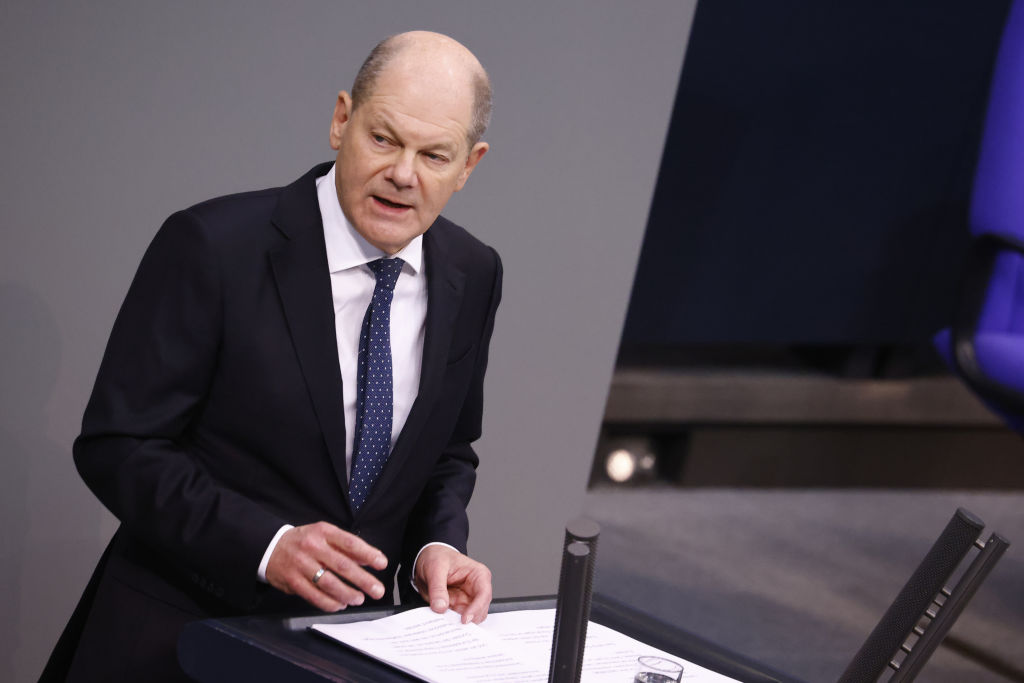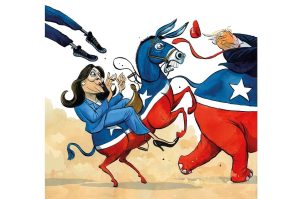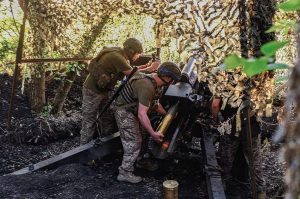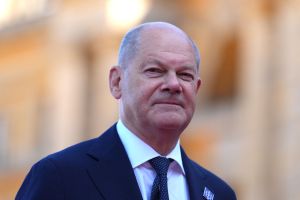New Year’s resolutions are notoriously difficult to keep. But when it comes to Ukraine, Europe hasn’t made any. There is no clear plan for 2024 on how to stop Russia from winning its war of aggression. With the future of American politics uncertain, it will fall to Europe to make a stand.
Initially lambasted for its reluctance to send weapons to Ukraine, Germany has since stepped up to the task and become its second largest contributor of military aid. Now, Chancellor Olaf Scholz is leading the call for others to do more, too. “Europe must show that it stands by Ukraine, by freedom, by international law and by European values,” he told the press earlier this week.
Aid for Ukraine is not only about absolute figures but also about reassurance and psychology
The German government announced last year that it wants to double the annual budget for helping Ukraine from €4 billion ($4.4 billion) to €8 billion ($8.8 billion). But Scholz’s warning was stark: “As important as our German contribution may be, it is not sufficient on its own to guarantee Ukraine’s security long term. I therefore call on our allies in the European Union to also bolster their efforts to support Ukraine. The arms deliveries so far planned by the majority of EU member states definitely fall short.”
Scholz is right to be worried. Russia has begun the new year as it ended the last: with a series of devastating missile attacks, including some supplied by North Korea according to reports. It is making advances on the front lines, too. Dedicated to winning at all costs, Russia is operating a war economy while Ukraine’s allies are distracted by their own domestic problems and other global issues like the war in the Middle East.
It will take collective, coordinated and sustained support to render the war unwinnable for Moscow. But the required unity is hard to come by. The leaders of most European countries have promised that they will do what it takes to prevent victory for Putin, but what exactly that means isn’t clear. The French president Emmanuel Macron, for instance, said last year that he wanted “Russia to be defeated in Ukraine” (but not “crushed”). Yet his country has contributed very little to that end on bilateral terms — despite his long-standing argument that Europe must become more independent when it comes to defense and security.
In an effort to pile on the pressure, Scholz is asking EU member states to put their cards on the table. By the next summit of leaders on February 1, he wants to see a list of the military contributions each has planned this year. Who will put their money where their mouth is remains to be seen.
Supporting Ukraine through the EU itself has also proved to be a thorny issue. In December, member states failed to agree on a €50 billion aid package. This would have given Kyiv some security over four years and sent a strong signal to Moscow about European determination to sustain Ukraine’s defense. But it was vetoed by Hungary.
Viktor Orbán’s administration has now indicated that it might budge, so long as the European Council gets to vote on the budget annually, giving Hungary a chance to use the issue as leverage to get concessions for itself. The issue for Ukraine then remains that it cannot plan its campaign in advance and the EU would hardly be sending a message of long-term commitment and unity to Russia under such an agreement.
Adding to the divide on whether and how much military aid should be supplied is the issue of the EU’s economic relationship with Ukraine. The Commission will probably push for the suspension of import duties on Ukrainian goods to be kept in place, while Poland, Hungary, Slovakia, Bulgaria and Romania would oppose this out of concern about domestic opposition to measures that threaten their countries’ agricultural sectors.
Help from outside the EU is also uncertain at best. In the US, the debate around aid for Ukraine has become tied up in a stalemate around immigration. In the upcoming presidential election, funding Kyiv’s war against Moscow is also not exactly a winner. In a recent survey, only 37 percent of Americans agreed that aid should be continued to be sent to Ukraine for as long as it requests it. Among Republicans, the figure dropped to 14 percent. With the election looming large on the geopolitical horizon, Zelensky can’t currently bank on long-term funding security from across the Atlantic.
Even Britain, once such a vocal ally to Ukraine and still its third largest bilateral supporter, has gone unnervingly quiet despite the fact that funding is due to run out in March. Former defense secretary Ben Wallace warned: “Without any indication they’re going to get any more money, it’s very hard to continue the leadership that the UK has been taking on Ukraine.”
In a strange reversal of roles, it is now the German government trying to build momentum behind Western support for Ukraine. And Scholz is right to do so. Aid for Ukraine is not only about absolute figures but also about reassurance and psychology. Armament production and strategic planning need time and set conditions to be coordinated properly. Russia needs to know that the West’s resolve will last as long as it takes.
As it stands, neither is a given. Much will depend on whether EU countries can set their differences aside to take responsibility for defending the continent.
This article was originally published on The Spectator’s UK website.





















